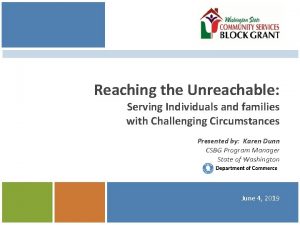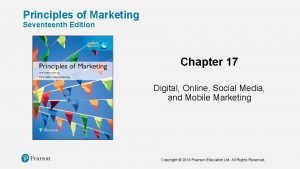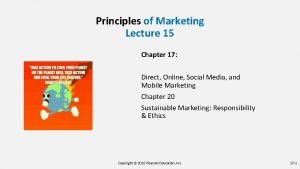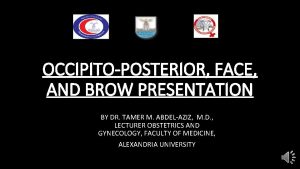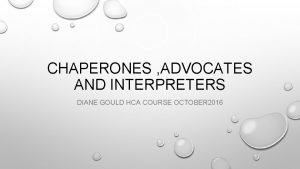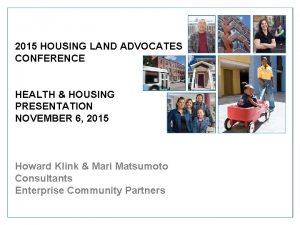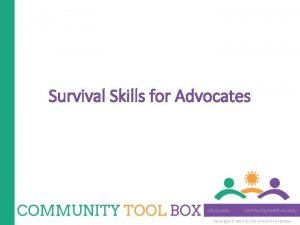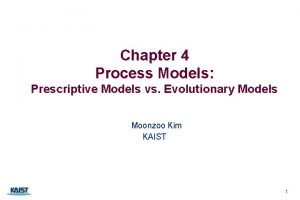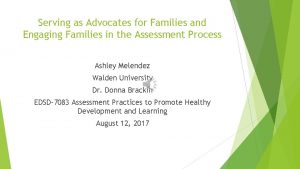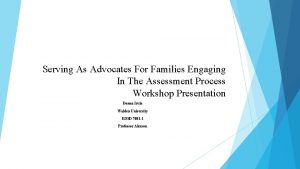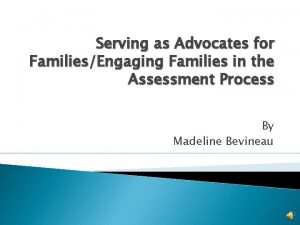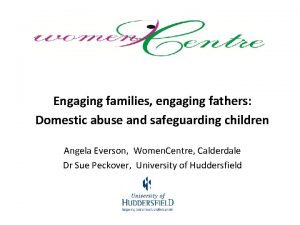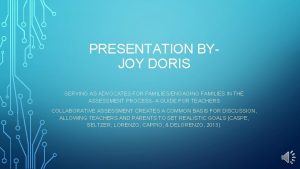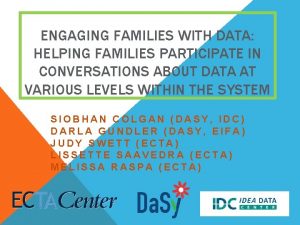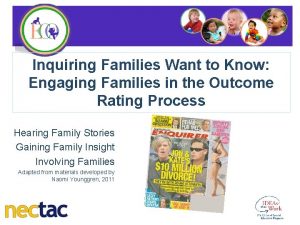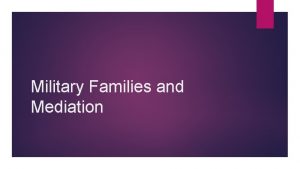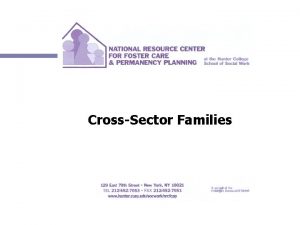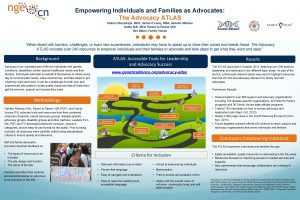Serving as Advocates for Families Engaging Families in












- Slides: 12

Serving as Advocates for Families Engaging Families in the Assessment Process Misty Kelman Walden University

Welcome Kindergarten O Overview O Assessment Importance at Kindergarten O How to involve families in assessment O What families can tell us about their child O How to communicate results of assessments to families O Supporting diversity and multiculturalism

Assessments and Their Importance in Kindergarten O Why do we assess our early childhood students? O Standards based accountability O Appropriate assessments identify student strengths and needs

Assessments and Their Importance in Kindergarten O Assessments should be ongoing O Assessments give teachers power in the classroom O Assessments are for goals, planning, and instruction

Families and the Assessment Process O Appropriate assessment involves families O Communication with families is important O Families have information to share

Families and the Assessment Process O So how do we get the families to be a part of the assessment process? O Interactions O Integrating O Providing access O Promote understanding O Create opportunities

Families O Stable families equal stable students O Foundational support starts at home O Sometimes families need support at home and not just at school

Families and Their Children O Families know when they are in need of help O Families know information that can help teachers and schools O Communication skills and trust are needed for these families

How to Communicate Assessment Data to Families O Create communication openings O Help families make the connections between assessments and the standards O Create a family/school journal O Invite families to meetings about assessments and their results

Diversity and Multiculturalism O Get to know the families in your classroom O Promote positive relationships O Create activities for families to complete together using their customs O Supply instructions in a language understood by the family

References O Caspe, M. , Seltzer, A. , Kennedy, J. L. , Capplo, M. , & De. Lorenzo, C. (2013). Engaging families in the child assessment process. Young Children, 68(3), 8 -14. Retrieved from http: //eds. a. ebscohost. com. ezp. waldenulibrary. org/eds/pdfviewer/pd fviewer? vid=1&sid=dc 36250 d-177 d-4863 -8605 c 412609 c 13 cb%40 sessionmgr 4007&hid=4102 O Dewey, E. , & Mitchell, E. (2014). Engaging with schools: National family resource centers. Reclaiming Children and Youth, 23(2), 3134. Retrieved from http: //eds. a. ebscohost. com. ezp. waldenulibrary. org/eds/pdfviewer/pd fviewer? vid=2&sid=95037 dae-beec-4 e 64 -82971 f 4355425964%40 sessionmgr 4008&hid=4102 O Elicker, J. , & Mc. Mullen, M. B. (2013). Appropriate and meaningful assessment in family-centered programs. Young Children, 68(3), 814. Retrieved from http: //eds. b. ebscohost. com. ezp. waldenulibrary. org/eds/pdfviewer/pd fviewer? vid=1&sid=23812 fbf-127 b-4 c 4 f-967 cda 6 c 5777212 f%40 sessionmgr 120&hid=117

References O Gullo, D. F. (2013). Improving instructional practices, policies, and student outcomes for early childhood language and literacy through data-driven decision making. Early Childhood Education, 413421. http: //dx. doi. org/10. 1007/s 10643 -013 -0581 -x O Hammack, B. G. , Foote, M. M. , Garretson, S. , & Thompson, J. (2012). Family literacy packs: Engaging teachers, families, and young children in quality activities to promote partnerships for learning. Young Children, 67(3), 104 -110. Retrieved from http: //eds. a. ebscohost. com. ezp. waldenulibrary. org/eds/pdfviewer/pd fviewer? vid=1&sid=30 bd 1735 -0 cd 4 -4906 -b 052 e 8 dfbd 3 a 7 eb 3%40 sessionmgr 4007&hid=4102 O Seefeldt, C. (2002). Assessment: Partnering with parents. Early Childhood Today, 17(1), 15 -17. Retrieved from http: //eds. a. ebscohost. com. ezp. waldenulibrary. org/eds/detail? vid=1&sid=f 7283 e 46 -fefa-4897 -9 f 28 b 8 ff 182 ba 03 f%40 sessionmgr 4010&hid=4113&bdata=Jn. Npd. GU 9 Z WRz. LWxpdm. Umc 2 Nvc. GU 9 c 2 l 0 ZQ%3 d%3 d#AN=9219633&db=a 9 h
 Serving individuals and families
Serving individuals and families Serving individuals and families
Serving individuals and families Marketing involve engaging directly with carefully targeted
Marketing involve engaging directly with carefully targeted Marketing involve engaging directly with carefully targeted
Marketing involve engaging directly with carefully targeted Presenting diameter in occipito posterior
Presenting diameter in occipito posterior Engaging dynamics
Engaging dynamics Khurana & khurana advocates and ip attorneys (delhi branch)
Khurana & khurana advocates and ip attorneys (delhi branch) Goggletranslate
Goggletranslate Khurana & khurana advocates and ip attorneys
Khurana & khurana advocates and ip attorneys Housing land advocates
Housing land advocates Early ob advocates
Early ob advocates Survival skills for advocates
Survival skills for advocates It advocates orderly approach to software engineering
It advocates orderly approach to software engineering

